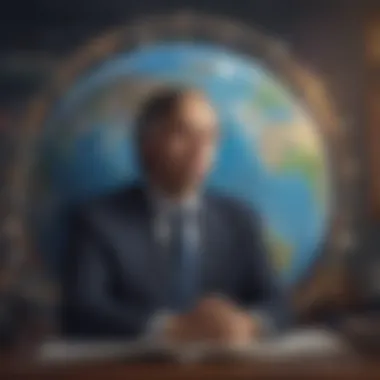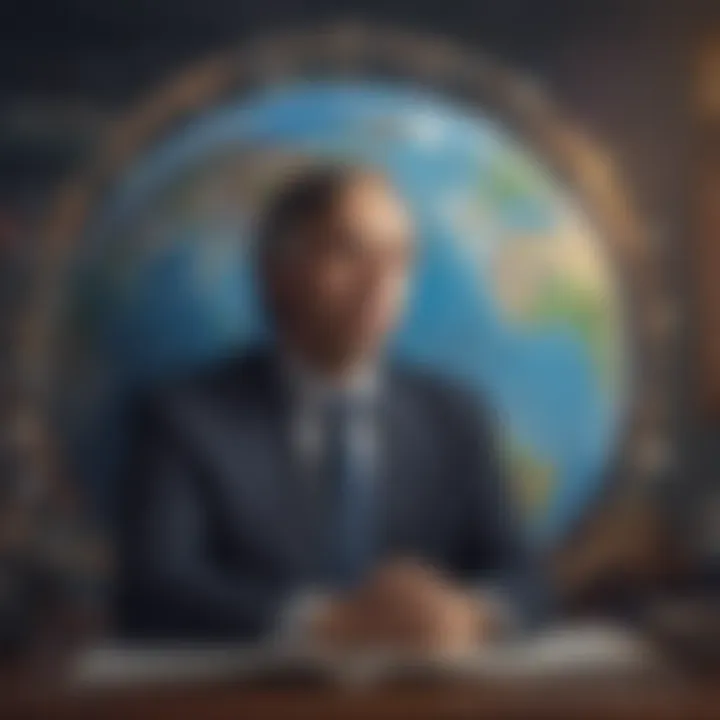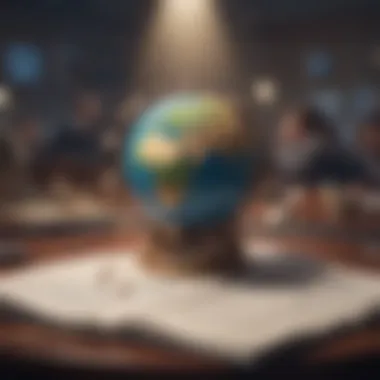Ray Dalio's Insights on Global Order Dynamics


Intro
Ray Dalio, a name synonymous with investment savvy and economic foresight, offers a lens through which we can examine the shifting sands of global order. His take isn't just for investment gurus; it resonates with anyone trying to wrap their head around the intricacies of today’s world dynamics. Dalio’s perspective hinges on understanding cycles—be they economic or political—and how they influence the fate of nations.
In our current climate, characterized by rapid change and uncertainty, distinguishing between transient trends and long-term shifts becomes critical. Dalio’s insights prompt us to reflect deeply on how historical patterns repeat and what that means for future societies. As we navigate these complexities, it’s crucial to recognize the interconnections between economic upheaval and political transformations.
This article aims to unpack Dalio's thoughts, providing a finger on the pulse of global affairs while simultaneously equipping readers to forge their own paths in an unpredictable environment. His principles can guide both policymakers and ordinary individuals alike, making it essential to explore this framework thoughtfully.
Foreword to World Order Concepts
In an increasingly interconnected world, the concept of world order has become a pressing topic of discussion. Understanding how nations interact, the influence of power dynamics, and the economic principles that underpin these relationships are critical, not just for academics or political theorists, but for anyone navigating today’s global landscape. In this article, we explore the insights of Ray Dalio regarding these complexities, shedding light onthe implications of his views for contemporary society.
Definition of World Order
World order refers to the arrangement of international relations and the system of governance that underpins global interactions. This might seem straightforward at first glance. However, delving deeper reveals that it embodies a web of political, economic, and social relationships. Think of it as the orchestration of various stakeholders, each playing their part in the grand tapestry of global affairs. This includes not just nation-states but also international organizations, multinational corporations, and even non-state actors like NGOs and terrorist groups.
Central to this concept is the recognition that the world does not operate in a vacuum. Factors such as historical conflicts, cultural contexts, and economic disparities have all played crucial roles in shaping the current world order. Dalio’s analysis emphasizes that understanding these factors not only helps to clarify the present landscape but also informs predictions about future dynamics. By grasping how the threads of history intertwine with modern forces, we can better understand the complexities we face today.
Historical Perspectives
History offers us valuable lessons about world order, often echoing in the patterns that emerge over centuries. Various civilizations have risen and fallen, and the mappings of these shifts provide essential context for our understanding. For instance, the transition from the Roman Empire to the Middle Ages saw a significant shift in power, with the rise of feudalism and the decline of centralized authority in much of Europe.
This shift can serve as a reflection for contemporary observers, illustrating how changes in governance and economy can drastically alter societal structures. Another noteworthy example includes the post-World War II order, which established institutions like the United Nations and the Bretton Woods system that aimed to prevent future conflict through cooperative global governance.
Such historical frameworks encourage us to analyze not merely through the lens of current events but with an understanding of the cyclical nature of power and influence. Ray Dalio often points out that ignoring these patterns is akin to sailing without a compass; without a solid grasp of history, the future becomes a murky terrain.
"Those who cannot remember the past are condemned to repeat it."
— George Santayana
Armed with historical awareness, we can better navigate the ongoing transitions in global power. Whether one considers emerging economies challenging established powers or the ramifications of shifting alliances, the importance of historical context cannot be overstated. Dalio’s perspective harnesses these lessons, making them relevant to today's challenges. This exploration of world order is not just academic; it informs real-world decisions that can lead to transformative outcomes.
Ray Dalio: A Brief Biography
When diving deep into the intricacies of global order through Ray Dalio’s lens, understanding the man himself is paramount. Dalio’s views don’t just spring from thin air; they are deeply rooted in his experiences, education, and the professional landscape he navigated over decades. A biography of Dalio sheds light on how he came to develop his distinctive outlook on economic cycles, political shifts, and the rise and fall of nations. It helps situate us in his world, offering a scaffold on which we can build our grasp of his philosophies. By exploring his formative years and career achievements, readers gain insight into the fundamental principles that drive his analysis of the global stage.
Early Life and Education
Ray Dalio was born in 1949 in New York City. Growing up in a middle-class family, he faced the usual pressures of life, but the turning point came in his adolescence when his interest in finance emerged. He attended Long Island University where he earned a degree in Finance, but his delving into the markets truly began after this initial learning period. Although many young graduates entered corporate America, Dalio ventured into the world of investing with an unusual vigor.
His early experiences at the New York Stock Exchange while still in college allowed him to see firsthand the force of market dynamics in action. Dalio’s drive for knowledge and understanding was insatiable. He studied economic histories and dissected case studies of past financial crashes and booms. As he has said, "You need to learn from history to figure out what’s going on now." This educational approach enabled him to form a nuanced understanding of economic principles, laying the groundwork for his later success.
Career and Achievements
After graduating, the path wasn’t seamlessly paved with success. Dalio started his career on Wall Street in 1972. He initially worked as a trader and by 1975, he founded Bridgewater Associates, a company that would evolve into one of the largest hedge funds in the world. His strategy involved a unique combination of quantitative research, risk assessment, and historical data analysis.
Dalio’s pioneering ideas introduced the world to concepts like radical transparency and meaningful work, which not only influenced his firm but also inspired many in the finance industry. He often states that the best decisions come from a foundation of knowing oneself and understanding others, reflecting his commitment to self-awareness as a core driver of effective decision-making.
Throughout his career, Dalio has received various accolades, including being named to the list of Time Magazine's 100 Most Influential People in the World. His book, "Principles: Life and Work," is not just about professional success; it also delves into life's complexities, intertwining personal philosophy with business.
"The most important thing is to have an idea. The second most important thing is to be able to execute it."
In essence, Ray Dalio's biography serves not just as a background, but as a prism through which we can better understand his significant contributions to the discourse on global order and economic cycles. Knowing who he is enriches our interpretation of his insights, offering a thorough comprehension of how his journey shaped the concepts he advocates today.
Dalio's Philosophical Foundations
Ray Dalio’s outlook on world order is rooted in a solid framework of principles that shape his understanding of complex systems, especially in economics and governance. These philosophical foundations do not merely serve as abstract theories; they are practical tools that individuals and leaders can use to navigate the turbulent waters of global affairs. Understanding these principles is crucial as they offer insight into Dalio's larger narrative about the dynamics of power, economic cycles, and the rise and fall of nations.
Principles of Effective Decision-Making
Dalio emphasizes a systematic approach to decision-making that encourages critical thinking and thorough analysis. He believes that effective decisions stem from understanding the underlying mechanisms of the world. Below are core components that define his approach:


- Radical Transparency: Dalio champions open communication where individuals share their thoughts candidly. This principle fosters an environment of trust and collective problem-solving. When people freely express their opinions, diverse insights can shine, leading to better outcomes.
- Radical Open-Mindedness: A willingness to consider alternate perspectives is paramount. Dalio stresses that recognizing biases in our judgment can lead to better-informed decisions. He suggests that one should consistently challenge their own beliefs to uncover truths that might be overlooked.
- The “5-Step Process”: According to Dalio, there are five clear steps to effective decision-making:
- Set clear goals: Know what you want to achieve.
- Identify problems: Understand what barriers stand in your way.
- Diagnose problems: Get to the root of these barriers.
- Design solutions: Create a plan to overcome them.
- Implement solutions: Take action and review results.
Dalio's framework encourages individuals and leaders alike to engage deeply with the issues at hand, rather than skimming the surface. Embracing these principles can significantly enhance one's ability to make sound decisions in an ever-evolving global landscape.
Understanding Economic Principles
At the heart of Dalio’s worldview is a firm grasp of economic principles that govern not only markets but also societal structures. A few notable ideas include:
- Economic Cycles: Dalio views economies as living entities that experience cycles driven by debt accumulation and de-leveraging processes. He breaks down the economy into short-term cycles, long-term debt cycles, and the consequences of these fluctuations on societies. With this understanding, one can predict shifts in economic power.
- The All-Weather Portfolio: This investment strategy, coined by Dalio, demonstrates the importance of diversification in weathering financial storms. By allocating resources across various asset classes, individuals can potentially safeguard against sudden economic shifts.
- Meritocracy and Innovation: Dalio argues that competitive meritocracy drives innovation and progress. In societies where the best ideas and individuals rise to the top, there are greater chances for breakthroughs that benefit the economy as a whole. He believes that leaders must embrace and cultivate this meritocratic spirit to ensure societal advancement.
By internalizing these economic principles, readers can gain a powerful lens through which to analyze both current events and their trajectories. The awareness of economic forces at play will not only refine personal decision-making but will also enhance leadership capabilities in a complex world.
The Changing Landscape of Global Power
The dynamics of global power are shifting like sand beneath our feet. In today’s interconnected world, the rise of new economic players and the decline of traditional powers are creating a vastly different landscape from what many have grown accustomed to. Ray Dalio’s insights provide a lens through which we can better grasp these changes. His pragmatic approach shines light on how these shifts affect everything from trade policies to international relations.
Understanding the transformations in global power is not just an academic exercise; it has real-world implications. As nations grapple with their roles on the global stage, it’s essential to consider the complexities behind these shifts and their broader consequences for society. Here, we explore how these power transformations play out in real life and their potential effects on the future.
Power Shifts and Their Consequences
Power is often described metaphorically as being akin to a game of musical chairs; when the music stops, many will find themselves without a seat. This analogy rings true for nation-states as they vie for influence on the world stage. Dalio emphasizes that power shifts are not merely the result of one country overtaking another; they’re part of a larger historical process shaped by numerous factors.
In the last several decades, we have seen a notable gradient towards decentralization of power. The ascension of countries like China and India symbolizes a significant rearrangement in the global order. As these nations gain economic traction, the power that once dominated the West faces scrutiny and challenge. This has led to realigning alliances and, in some cases, unprecedented tensions.
The consequences of these shifts can manifest in several ways:
- Economic Instability: As emerging economies gain prominence, traditional powers face challenges in maintaining economic dominance.
- Geopolitical Tensions: Rivalries may surface as established powers work to retain their influence and emerging economies seek to assert their standing.
- Cultural Exchange: This constant flux creates opportunities for greater cultural exchange, but it also risks cultural clashes, as differing values and norms compete for acceptance on the world stage.
"A nation’s power, similar to an intricate tapestry, weaves together multiple threads of economic, military, and cultural influences. As the threads shift, so too shall the tapestry of global order."
Emerging Economies vs. Established Powers
The tug-of-war between emerging economies and established powers is perhaps the most telling aspect of the shifting landscape. As nations like Brazil and South Africa join the ranks of economic contenders, their rise comes accompanied by both promise and peril. Ray Dalio articulates that the competition for supremacy between these diverse groups is central to understanding contemporary international relations.
Emerging economies wield unique advantages that can challenge established powers. These include:
- Demographic Advantages: Many emerging nations boast youthful populations that can drive innovation and consumer markets.
- Resource Richness: Countries rich in natural resources can capitalize on their wealth, thus elevating their economic standing.
- Flexibility and Innovation: New players often adapt more quickly to technological changes and consumer demands, allowing them an edge in certain global markets.
However, it’s not all smooth sailing. Established powers, though sometimes prone to stagnation, possess certain strengths:
- Institutional Experiences: Established nations often have the frameworks and infrastructures that allow for stability and reliability, which are attractive to investors.
- Military Might: Established powers still hold significant military capabilities, which can impact global balance.
- Historical Relationships: Long-standing alliances and partnerships formed over decades provide additional layers of influence and networking.
All in all, the tug-of-war between these emerging entities and established nations represents a microcosm of the broader shifts in global governance. Individuals and organizations looking to navigate this ever-changing landscape must keep a sharp eye on the undercurrents that Dalio so emphatically unpacks.
Economic Cycles and Historical Patterns
Exploring economic cycles is like peering into the intricate heart of human civilization. They have a profound impact on how societies evolve over time and how global order is shaped. Economic cycles, by nature, create waves of boom and bust that not just affect economies, but they also alter political structures, societal norms, and even individual lives. Understanding these cycles offers a lens through which one can view the rise and fall of empires, the dynamics of trade, and the behavioral patterns that emerge during different phases of economic activity.
In the context of this article, delving into economic cycles is not merely academic. It invites a deeper exploration of how past trends influence current geopolitical realities and the potential pitfalls that leaders and individuals might face in the future. The cyclical patterns in economics often reflect larger historical movements, suggesting that history has a way of repeating itself.
Analyzing Long-Term Economic Cycles
When analyzing long-term economic cycles, it’s essential to recognize the patterns that extend beyond typical market fluctuations. Typically, these can be categorized into four main phases: expansion, peak, contraction, and trough. Each phase carries unique characteristics:
- Expansion: Marked by rising GDP, increasing employment, and heightened consumer confidence. It’s a phase where everything seems to flourish.
- Peak: The turning point of rising economic activity. Here, inflation often creeps in, and while the economy is at its height, signs of inefficiencies begin to surface.
- Contraction: Economic activity slows down; businesses may begin to cut jobs, and consumer spending typically wanes. It’s the classic “bear market” period where pessimism reigns.
- Trough: The lowest point in the cycle leads to stabilization before recovery starts. It’s like the calm before the storm when the groundwork gets laid for the next expansion.
Understanding these cycles allows individuals, businesses, and governments to prepare and possibly mitigate adverse outcomes. The most effective fiscal and monetary policies can stem from a sound comprehension of where an economy stands in this continuum.


"Cycles show us that everything is in flux; prosperity gives way to hardship, and hardship fosters opportunity."
The Role of Debt in Economic Fluctuations
Debt plays a pivotal role in economic fluctuations. It acts both as an enabler of growth during expansion and as a potential anchor during downturns. As economies grow, the appetite for credit tends to surge. Companies and individuals often take on debts believing that future income will cover it. This can lead to precarious situations:
- Over-leverage during Booms: During prosperous moments, businesses often underestimate risks, leading to excessive borrowing. This can create bubbles in various sectors, like housing or tech.
- Vulnerability during Busts: When the economy takes a downturn, those debts become burdensome. Companies falter, jobs are lost and consumer confidence drops even further.
- Cyclical Nature of Debt: Historically, nations that accumulated significant debt during economic booms often found themselves dive-bombing into recessions, requiring sometimes drastic measures for recovery, such as austerity policies or restructuring.
By acknowledging the connection between debt and economic cycles, leaders can formulate strategies that either encourage prudent borrowing or implement safeguards to cushion against potential shocks. In this way, understanding economic cycles isn't just about predicting the future; it’s about informing actionable insights that can guide decisions at individual and national levels.
The Rise and Fall of Empires
Understanding the rise and fall of empires is crucial for grasping the complexities of world order, particularly through Ray Dalio's lens. This historical perspective offers vital insights into the cyclical nature of global dominance and the patterns that govern the fate of nations. According to Dalio, observing these dynamics can help current leaders and individuals alike navigate the tumultuous waters of our world today.
Empires rise for various reasons, including economic strength, military power, and effective governance. However, the fall of empires often unfolds under the weight of overextension, internal conflict, or shifts in trade and technology. These are critical factors that must be considered when analyzing the trajectory of any established power.
Historical Examples of Decline
Throughout history, there are multiple instances that illustrate the decline of once-powerful empires. For example:
- The Roman Empire: At its peak, it wielded control over vast territories. However, due to internal strife, economic woes, and barbarian invasions, it slowly crumbled. The division of the empire into the Eastern and Western Roman Empires marked the beginning of its fragmentation, a classic case of overreach and mismanagement.
- The British Empire: Once the largest empire in history, it faced decline largely due to economic pressures post-World War II, alongside growing independence movements within its colonies. This empire's fall highlights the importance of adaptability and the consequences of complacency.
- The Ottoman Empire: This empire, with a rich cultural and political legacy, began to decline due to corruption, ineffectiveness in leadership, and the rise of nationalism among its diverse peoples. It serves as a prime example of how internal discord can lead to collapse.
These historical events underscore a simple but powerful truth: empires do not fall overnight. Rather, it is a gradual process influenced by multiple, interconnected factors.
Lessons from Historical Failures
Reflecting on the decline of empires provides valuable lessons for contemporary leaders and policymakers. Here are some key takeaways:
- Importance of Foresight: Dalio emphasizes that recognizing early signs of decline can be pivotal. Leaders need to look ahead and anticipate challenges to avoid repeating the mistakes of the past.
- Economic Sustainability: Economic health is often the backbone of any empire. Dependence on external resources without building solid domestic foundations can lead to vulnerability, as evidenced by various historical precedents.
- Flexibility in Governance: Successful leaders adapt to changing circumstances. The rigidity often seen in historical empires, such as during the British and Ottoman empires’ falls, signals how detrimental a lack of adaptability can be in governance.
- Unity Over Division: A united populace stands a better chance against external threats. Historical examples show that infighting and disunity can precipitate vulnerability and pave the way for decline.
"Understanding the past is crucial in shaping the future." - Ray Dalio
These lessons not only highlight the significance of historical context in contemporary governance but also shed light on individual responsibility and leadership approaches as we navigate an unpredictable world. By learning from the past, society can pave a more stable future.
Crisis and Opportunity in Global Affairs
In the realm of global affairs, crisis often walks hand-in-hand with opportunity. As Ray Dalio asserts, understanding the dynamics that underlie these moments is paramount, especially when the world seems precarious. In these times of uncertainty—politically, economically, and socially—the fabric of societies is stretched thin. However, this very tension can also pave the way for transformative change. Recognizing this duality is crucial to making informed decisions that can weather the storms of change while seizing new prospects.
The interplay between crises and opportunities is not just theoretical. Historical patterns show that significant social, economic, or political upheavals often reshape societies and economies in profound ways. For instance, the aftermath of the 2008 financial crisis catalyzed reforms in banking regulations, igniting discussions on transparency and accountability. Similarly, the shift in global power dynamics prompts new alliances, often leading to groundbreaking negotiations and innovative policies.
Navigating Turbulent Times
Navigating through turbulent times requires a steady hand and clear vision. Individuals and leaders alike face the daunting task of discerning which actions to take in the face of uncertainty. Dalio emphasizes the importance of a principled approach grounded in understanding historical cycles and economic indicators. By studying past crises, one can identify patterns—what worked, what didn’t, and why. This historical lens becomes invaluable for understanding current dilemmas and potential solutions.
To illustrate this point, consider the geopolitical tensions simmering in different parts of the world today. From the precarious relationship between the United States and China to the instability in parts of the Middle East, leaders find themselves in a labyrinth of choices. Having a framework that holds the weight of history allows them not only to react but to anticipate.
"In every crisis, there exists a corresponding opportunity."
— Ray Dalio
Opportunities for Reform
Crises serve as a stark reminder of the vulnerabilities within systems but also highlight openings for reform. They can act as a catalyst for change, pushing societies to rethink outdated paradigms and adopt new technologies. For example, the COVID-19 pandemic unveiled gaps in health systems worldwide, igniting discussions around universal healthcare and accessible solutions. These conversations can often lead to significant policy shifts.
Leaders and individuals need to recognize these openings to reform as opportunities to innovate solutions that are more equitable and sustainable. The key lies in readiness—willingness to adapt and revise existing frameworks when confronted with crises. To harness these opportunities, groups should:
- Engage in proactive dialogues: Facilitate open conversations that allow diverse perspectives to surface.
- Promote interdisciplinary approaches: Combine insights from various disciplines to inform more holistic solutions.
- Leverage technology, which can enable more agile responses to crises and better disseminate information.
By remaining vigilant and adaptive, society stands a better chance of turning crises into constructive movements towards progress. In the crucible of chaos, opportunities for meaningful reform await those with the foresight to seize them.
Ray Dalio's Vision for Future Governance


Understanding Ray Dalio's vision for future governance is paramount, particularly in an era where change and uncertainty seem to be the norms rather than the exceptions. Dalio, a renowned investor and thought leader, emphasizes a framework that aligns governance structures with the realities of today's global challenges. His perspectives combine historical context with modern-day dilemmas, providing valuable insights that resonate across different sectors, be it political, economic, or social.
In an interconnected world, the way we govern matters immensely. With rising populism and shifting power structures, the need for a cooperative and effective governance system is more crucial than ever. This section seeks to illuminate the significant elements of Dalio’s vision. It will delve into the benefits this vision can offer, addressing how it prepares leaders and individuals to tackle pressing global issues.
Proposed Solutions for Global Issues
Dalio’s approach to governance is inherently proactive, advocating for practical solutions to pressing global issues. He articulates a need for frameworks that are flexible and adaptable to the dynamic shifts in the global landscape. A few solutions he proposes include:
- Emphasis on Transparency: Transparency fosters trust and accountability. By ensuring that information is available and accessible, governance systems can withstand scrutiny.
- Data-Driven Decision-Making: Utilizing data analytics allows leaders to make informed choices. Dalio stresses the importance of collecting and analyzing data to understand trends and predict economic and social shifts.
- Implementing Feedback Mechanisms: Feedback loops in governance can offer insights into the effectiveness of policies. Such mechanisms allow for tweaks and adjustments as needed instead of waiting for policy failure to occur.
- Encouraging Civic Involvement: Engaging citizens in the governance process can lead to more representative and relevant decisions. Dalio promotes inclusive frameworks where people are encouraged to voice concerns and ideas.
Dalio believes that these solutions not only address current challenges but also set the stage for sustainable governance practices that endure in the long run.
Collaborative Approaches to Governance
In an increasingly polarized world, collaborative approaches to governance stand out as a pivotal element of Dalio's vision. He posits that global issues demand solutions that go beyond national borders, advocating for partnerships that leverage the strengths of multiple stakeholders. Here are some key components of such collaborative efforts:
- Multilateral Engagement: Cooperation among nations can yield comprehensive solutions to global problems. This can take shape in international treaties or joint efforts in fields like climate change and public health.
- Cross-Sector Collaboration: Collaboration across different sectors—such as government, business, and civil society—can capitalize on unique strengths. For instance, by integrating resources from technological firms, governments can enhance public service delivery.
- Building Trust: Trust between parties (nations, organizations, individuals) is the bedrock of successful collaboration. Dalio emphasizes that without trust, initiatives are likely to falter or fail altogether.
- Shared Goals and Objectives: Establishing common goals creates a unified direction for collaborative efforts. By working towards shared objectives, stakeholders can mobilize resources more effectively and measure success collectively.
Dalio’s insights signal a clear necessity: future governance must prioritize collaboration to navigate the complexities of global affairs. As societies encounter multifaceted challenges, embracing a collaborative approach becomes a critical pathway for meaningful governance.
Implications for Individuals and Leaders
Understanding the implications of Ray Dalio's perspectives on world order is crucial for both individuals and leaders in today’s increasingly complex global landscape. As Dalio articulates, the behaviors and interactions of nations are not just abstract concepts; they have concrete impacts on our daily lives and the future of governance. His ideas serve as a wake-up call for personal and collective responsibility in navigating the turbulent waters of global politics and economics.
Understanding Personal Responsibility
Dalio emphasizes the importance of personal responsibility in shaping the world around us. In a system where global dynamics often seem beyond an individual's control, recognizing one’s role can be empowering. Individuals play their part by making informed decisions, staying educated about political and economic developments, and engaging in constructive dialogue. They should not merely be passive observers but active participants in their communities.
Here are some key considerations about personal responsibility:
- Educate Yourself: Staying informed about global events, economic trends, and political shifts is essential. Relying on facts and unbiased sources can lead to informed opinions and actions.
- Engage with Others: Discussion and debate are vital. Engaging with diverse perspectives challenges our thinking and fosters a better understanding of complex issues.
- Take Action: Whether by voting, participating in civic activities, or founding initiatives, active involvement can initiate change. Every small step matters in the grand scheme.
Leadership in a Changing World
Leaders today face a daunting challenge: to steer society through rapid changes while remaining grounded in principles that promote equity and growth. Dalio posits that effective leadership hinges on a few core elements—insight, adaptability, and moral clarity.
In these shifting sands, leaders must:
- Demonstrate Adaptability: The ability to pivot in response to new information or changing circumstances is crucial. This doesn’t mean being fickle but rather being responsive to reality.
- Prioritize Collaboration: In an interconnected world, collaboration can yield innovative solutions. Leaders must build alliances and networks that leverage diverse strengths.
- Maintain Ethical Standards: The moral compass of a leader influences their decisions and the culture of their organization or country. Upholding ethical practices fosters trust and encourages others to do the same.
“Leaders who remain convinced of their infallibility will find the tides of change set against them.”
Understanding Dalio’s framework illuminates a path forward. Individuals have a stake in their governance, and leaders must be more than managers; they must be visionaries who inspire others to join them in addressing today’s complex challenges.
Epilogue
In reflection, the topic of Ray Dalio's insights into world order holds significant relevance both for contemporary society and for individuals navigating an increasingly complex global landscape. A synthesis of his ideas sheds light on the intricate interplay of economic, political, and social forces that define the current era. Dalio's frameworks are not just theoretical musings; they are actionable thoughts that invite leaders and everyday people to consider their roles within the broader system.
Synthesis of Key Insights
Dalio emphasizes the cyclical nature of history, where patterns tend to repeat over time. This perspective encourages a deeper understanding of past events and their implications for the future. Key insights include:
- Economic Cycles: Recognizing the ebb and flow of economic prosperity allows for better preparation for downturns.
- Power Dynamics: The constant shifts in global power remind us that no nation can rest on its laurels.
- Lessons from Empires: Historical failures emphasize the importance of adaptability to maintain relevance in a changing world.
These insights serve as a guide for both leaders looking to navigate geopolitical tensions and individuals aiming to grasp their place in this intricate web.
The Path Forward
As we think about the path forward, actionable strategies become crucial. Dalio advocates for a multitude of collaborative approaches, including:
- Global Cooperation: Countries must learn to engage constructively, prioritizing shared interests over competition.
- Adaptive Governance: Leaders are encouraged to adopt flexible policies that can respond to rapid change and emerging challenges.
- Education for Future Generations: The need for informed citizens who understand these dynamics is paramount in fostering resilient societies.
"The key to successful decision-making is to understand your own principles and remain open to new information." - Ray Dalio
In this light, the pursuit of knowledge about world order is not just a scholarly endeavor; it is a necessary skill for anyone who wishes to thrive in a world characterized by rapid change and complexity.







